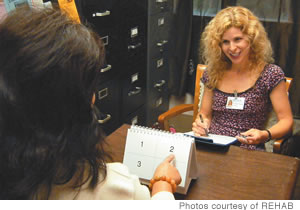Assessing Brain Injuries
Interviewed by Melissa Moniz
Wednesday - July 23, 2008
E-mail this story | Print this page | Comments (0) | Archive
 Del.icio.us Share
Del.icio.us Share

Dr. Tanya J. D’Avanzo
Neuropsychologist
What is your job description?
I am a clinical psychologist with specialized advanced training in the brain basis of behavior. I conduct assessments to see how brain injury or disease has affected an individual’s cognition, ability and functioning. I do a variety of things. I am on staff at the Rehabilitation Hospital of the Pacific, where I conduct brief assessments with patients who’ve suffered stroke or traumatic brain injuries. I also work with a team of practitioners from other related disciplines to help them meet their rehabilitation goals. I see outpatients in my private practice, where I get referrals to conduct more comprehensive assessments for patients with suspected or confirmed brain dysfunction. I also work one day a week at the Department of Veterans Affairs, where I see patients and also train predoctoral psychology interns in the discipline.
How long have you been practicing?
For 12 years.
Why does someone seek out a neuropsychological evaluation?
Basically neuropsychologists address issues on two sides of the same coin. One is diagnostic. Does someone have brain damage? This may come up in medical-legal cases, or in situations where it is unclear whether or not an individual’s deficits are related to neurological or psychological factors. If it is the former case, we are called upon to help determine the likely etiology of the brain dysfunction. Alternatively, we may do an evaluation to determine how brain damage has affected someone’s functioning in order to make recommendations for their treatment and care.

|
Which of the two types of evaluations do you see more often?
I’d say it’s about a 50/50 split.
Can you explain the general process of each of the two evaluations?
I administer a battery of standardized tests tailored to the referral question. In a typical comprehensive battery, measures of premorbid (before injury) and current cognitive functioning are administered, along with measures of motor and sensory functioning, mood and personality.
What types of disorders do you deal with in your practice?
Anything that can affect the brain. The most common types of patients I see are victims of stroke, traumatic brain injury, epilepsy and dementing disorders such as Alzheimer’s disease and Parkinson’s disease.
How do you collaborate with other professionals?
At REHAB, I am a member of the team that is made up of medical doctors, nurses, therapists and social workers. In the outpatient work, I often collaborate with neurosurgeons and neurologists to see if patients are appropriate for brain surgery. I work closely with the referring physician to determine the best course of treatment in all cases.
You are also an advocate for mental health issues and have been recognized recently by the Hawaii Psychological Association with the Distinguished Service Award for Dedicated and Meritorious Service to the Advancement of Psychology. Can you discuss your volunteer efforts and your involvement with HPA?
I have been very active in volunteer work on both the state and national level. I am the past president Hawaii Psychological Association (HPA). Currently, I am a member of the HPA Ethics Committee. I have been active with lobbying efforts to promote mental health both
locally and on Capitol Hill in Washington, D.C. On a national level, I am actively involved with the National Academy of Neuropsychology. This year, I am the chairperson organizing their annual fundraising dinner, which will take place in New York City and where we will be honoring professional athletes who suffered brain injury. We are highlighting the work of Pat LaFontaine, who is a National Hockey League Hall-of-Famer. The money raised will go to help promote work in the area of sports-related brain injuries.
E-mail this story | Print this page | Comments (0) | Archive
Most Recent Comment(s):













